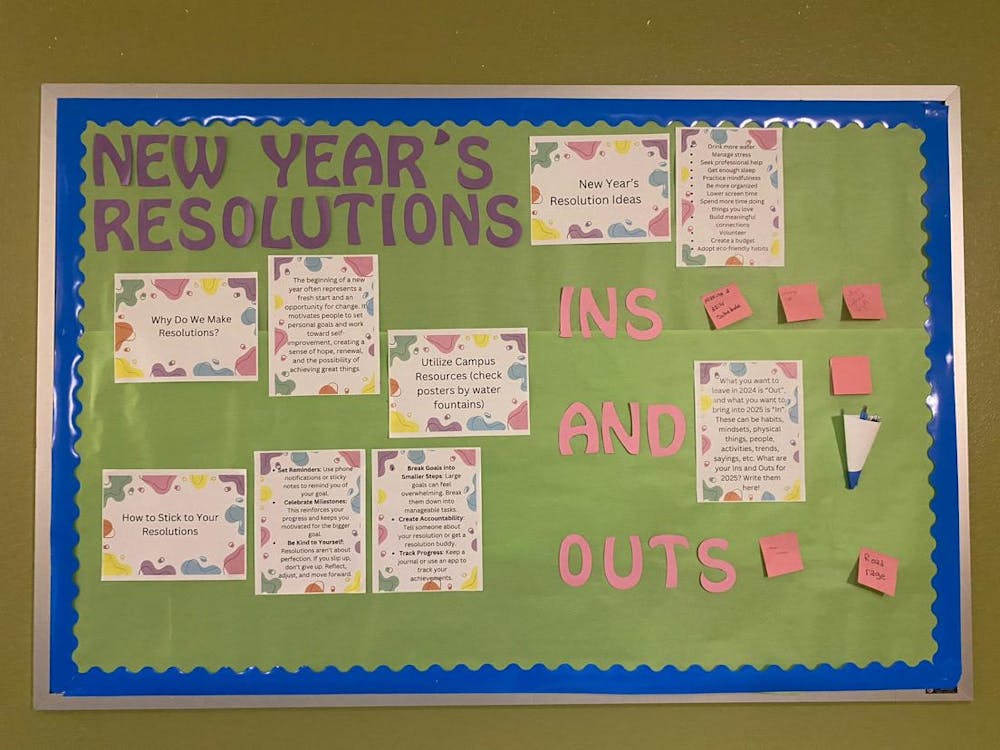A freshman was busy at work in one of the University of Northern Colorado’s residence halls, but not for any exam, quiz or even a class.
She worked in a whirlwind, designing posters advertising a friendship bracelet making event and hanging them all over the building.

After laying out all of the beads, the string and the free food in one of the shared spaces in Harrison Hall, Savannah Burgess waited.
But only one person came to her friendship bracelet event that evening.
In 2023, Burgess was a resident assistant at UNC and was tasked with fostering connections with the other residents on her floor and offering resources for students.
"I got all the supplies for it. I put up signs and everything. I put signs on everyone's door. I texted our GroupMe quite a few times,” Burgess said. “I mean, I was kind of excited to be able to meet some people on my floor and hopefully build some community.”
Burgess, now a junior pursuing a degree in nursing, became an RA during the spring semester of her freshman year, which is a very uncommon situation. UNC wants their residential staff to be well-acquainted with the campus, she explained, but the circumstances at hand made the university change their criteria.
“The resident assistant is a live-in position (requires you to live in assigned community) that seeks to maximize student involvement and learning through leadership opportunities, academic support initiatives and dynamic programs designed to assist residential students in their own personal development,” according to the official RA job description posted online.
However, limited student participation was a common occurrence for Burgess and many other RAs.

“A lot of people on that floor stayed in their rooms like the entire day. They wouldn't socialize a lot, at least that I could see.” Burgess said. “That made me sad, and I wanted to bring our floor together.”
The RA of each building is responsible for a long list of tasks, some of which are easier than others. They are required to uphold the housing policies through example, support academic success in their residents, provide crisis response in the dorms, and, on top of that, work 12 to 16 unpaid desk hours per pay period.
“We're kind of like a ‘resource giver,’” Burgess summarized.
A part of the job that Burgess prided herself on were the decorations. When working in South Hall, she decorated not just the students' doors and the bulletin boards with a SpongeBob makeover, but the common spaces as well.
“I had jellyfish up, and I had ‘Bikini Bottom’ signs,” Burgess said. “We had two kitchens on our floor, so one of them was the ‘Krusty Krab,' and the other one was the ‘Chum Bucket,' which I thought was pretty cute.”
An example of the hand-made door decorations for her floor in South Hall.
Burgess had a close relationship with her residents and most of them appreciated the decor and the environment that she fostered for them.
On average, Burgess was dedicating nearly 10 hours per week to being an RA, typically pulling late hours. On top of this, she’s a nursing major, which is one of the most time-intensive and difficult majors offered at UNC.
“Being an out-of-state student, tuition is a lot higher, and so I wanted to do something that I thought would be easy enough that would lower my tuition,” Burgess said. “I honestly wish that I just would have gotten a full-time job, because that would have paid a lot more.”
Even though Burgess enjoyed the work, she felt like she was under a lot of pressure. She dealt with stressful situations around the clock, balancing her own schedule and upholding the code of conduct for the university.
“You always have to be on your best behavior. You have to be a role model, and you just have to be careful,” Burgess said. “It feels like you always have eyes on you, even when you're in the privacy of your own dorm. I mean, people knocked on my door frequently.”
If not for a policy change last year, there is a high likelihood that Burgess would have continued to be an RA. The university made the decision to prevent students pursuing nursing and education degrees from being RAs.
“That was upsetting for a lot of students who, you know, had been RAs for a while and wanted to continue, but because they were nursing, they were no longer allowed to,” Burgess said.
Despite not being able to continue being an RA, Burgess explained how she still wanted to help the university by applying to work at the front desk. Since she already had all of the training, she felt like it would be an easy transition. But Burgess feels that the university could do more to accommodate for student employees coming from out-of-state.
“The training for the desk assistant role was during the one week I had to visit home, and they would not work with me to schedule a different training day,” Burgess explained. “I chose to see my family, and passed up a really good job opportunity.”
In the end, Burgess was happy that she got to foster community within UNC, but wishes that it did not come at the cost of her well-being.
"I wouldn't necessarily recommend it to anyone. I think you can make more money just working like an hourly job, and you'll keep a bit of your sanity,” Burgess concluded.






